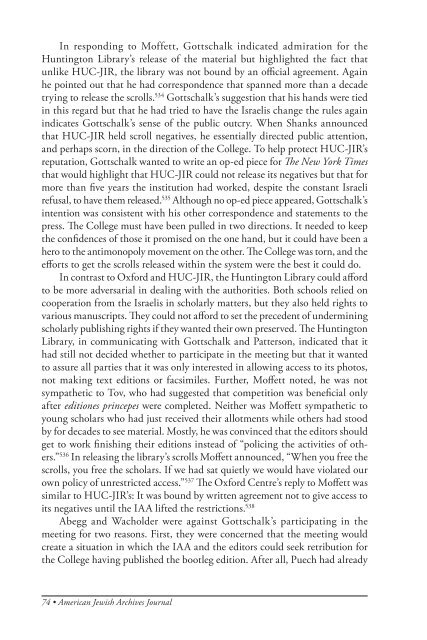The American Jewish Archives Journal, Volume LXI 2009, Number 1
The American Jewish Archives Journal, Volume LXI 2009, Number 1
The American Jewish Archives Journal, Volume LXI 2009, Number 1
You also want an ePaper? Increase the reach of your titles
YUMPU automatically turns print PDFs into web optimized ePapers that Google loves.
In responding to Moffett, Gottschalk indicated admiration for the<br />
Huntington Library’s release of the material but highlighted the fact that<br />
unlike HUC-JIR, the library was not bound by an official agreement. Again<br />
he pointed out that he had correspondence that spanned more than a decade<br />
trying to release the scrolls. 534 Gottschalk’s suggestion that his hands were tied<br />
in this regard but that he had tried to have the Israelis change the rules again<br />
indicates Gottschalk’s sense of the public outcry. When Shanks announced<br />
that HUC-JIR held scroll negatives, he essentially directed public attention,<br />
and perhaps scorn, in the direction of the College. To help protect HUC-JIR’s<br />
reputation, Gottschalk wanted to write an op-ed piece for <strong>The</strong> New York Times<br />
that would highlight that HUC-JIR could not release its negatives but that for<br />
more than five years the institution had worked, despite the constant Israeli<br />
refusal, to have them released. 535 Although no op-ed piece appeared, Gottschalk’s<br />
intention was consistent with his other correspondence and statements to the<br />
press. <strong>The</strong> College must have been pulled in two directions. It needed to keep<br />
the confidences of those it promised on the one hand, but it could have been a<br />
hero to the antimonopoly movement on the other. <strong>The</strong> College was torn, and the<br />
efforts to get the scrolls released within the system were the best it could do.<br />
In contrast to Oxford and HUC-JIR, the Huntington Library could afford<br />
to be more adversarial in dealing with the authorities. Both schools relied on<br />
cooperation from the Israelis in scholarly matters, but they also held rights to<br />
various manuscripts. <strong>The</strong>y could not afford to set the precedent of undermining<br />
scholarly publishing rights if they wanted their own preserved. <strong>The</strong> Huntington<br />
Library, in communicating with Gottschalk and Patterson, indicated that it<br />
had still not decided whether to participate in the meeting but that it wanted<br />
to assure all parties that it was only interested in allowing access to its photos,<br />
not making text editions or facsimiles. Further, Moffett noted, he was not<br />
sympathetic to Tov, who had suggested that competition was beneficial only<br />
after editiones princepes were completed. Neither was Moffett sympathetic to<br />
young scholars who had just received their allotments while others had stood<br />
by for decades to see material. Mostly, he was convinced that the editors should<br />
get to work finishing their editions instead of “policing the activities of others.”<br />
536 In releasing the library’s scrolls Moffett announced, “When you free the<br />
scrolls, you free the scholars. If we had sat quietly we would have violated our<br />
own policy of unrestricted access.” 537 <strong>The</strong> Oxford Centre’s reply to Moffett was<br />
similar to HUC-JIR’s: It was bound by written agreement not to give access to<br />
its negatives until the IAA lifted the restrictions. 538<br />
Abegg and Wacholder were against Gottschalk’s participating in the<br />
meeting for two reasons. First, they were concerned that the meeting would<br />
create a situation in which the IAA and the editors could seek retribution for<br />
the College having published the bootleg edition. After all, Puech had already<br />
74 • <strong>American</strong> <strong>Jewish</strong> <strong>Archives</strong> <strong>Journal</strong>

















